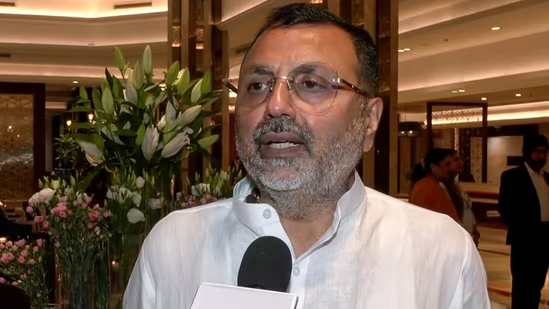
BJP
In a bold and thought-provoking remark, BJP Member of Parliament Nishikant Dubey has stirred political waters by stating that the Bharatiya Janata Party (BJP) would struggle to secure even 150 seats in the Lok Sabha without the leadership of Prime Minister Narendra Modi. This candid assertion has not only raised eyebrows within the BJP but also reignited discussions about the party’s dependence on one charismatic leader for its electoral fortunes.
A Stark Reality Check
Speaking at a public function, Dubey remarked, “If Modi ji is not there, BJP will not get even 150 seats. Today, even those who oppose the BJP are voting for the party just because of Modi.” While many in the party have often subtly acknowledged PM Modi’s unmatched mass appeal, rarely has a sitting MP so openly admitted to the level of reliance the BJP places on its top leader.
Dubey’s comment underscores a deep concern: has the BJP become a one-man show? And what does it mean for a political organization when its future is so closely tied to one individual?
Modi’s Dominance in Indian Politics
Since becoming Prime Minister in 2014, Narendra Modi has led the BJP to consecutive electoral victories, transforming the party into a political juggernaut. His personal charisma, assertive governance style, and ability to connect with the masses have helped the BJP expand into regions where it previously had little influence.
Modi is not just a face of the party — he is often seen as its heartbeat. In campaign after campaign, the BJP has banked heavily on his rallies, roadshows, and tailored messaging, while downplaying or sidelining regional leaders or lesser-known candidates. His image of a strong, incorruptible, development-focused leader has resonated with vast sections of the electorate, from urban youth to rural farmers.
A Party Too Reliant?
While Modi’s popularity has undoubtedly helped the BJP grow, Dubey’s statement highlights the potential risks of this over-dependence. Political analysts argue that building a sustainable, long-term party apparatus requires nurturing second-tier leadership — something the BJP is struggling with.
Even senior leaders like Amit Shah and JP Nadda have not been able to match Modi’s magnetism. The lack of visible, credible successors creates a leadership vacuum that could prove dangerous in a post-Modi era.
Moreover, the centralization of power and decision-making in Modi’s hands has led to concerns about democratic functioning within the party. Critics often argue that dissent or diversity of thought is discouraged, and that local leaders fear challenging the high command.
Opposition’s Perspective
Unsurprisingly, opposition parties were quick to pounce on Dubey’s comments. The Congress said the statement proves what it has always alleged — that the BJP is nothing without Modi. Shiv Sena (UBT) leader Sanjay Raut added, “It is not a party with ideology anymore; it is a brand named Modi.”
These remarks add fuel to the opposition’s strategy of portraying the BJP as a one-man army with no institutional depth or future vision beyond Modi’s tenure.
Within the BJP: Support or Discomfort?
Interestingly, Dubey’s comment has not drawn major public rebuke from senior BJP leaders, which could mean two things — either his words reflect an uncomfortable truth that the party quietly agrees with, or they are considered too risky to be amplified by engagement.
Some party insiders believe that such statements could be part of a larger internal conversation about preparing for the post-Modi era. With the Prime Minister already in his mid-70s, and the BJP known for its internal retirement age of 75 for elected posts, the question of succession is inevitable.
What Lies Ahead?
If Dubey’s claim holds weight, then the BJP must urgently work on decentralizing its appeal and building a strong cadre of leaders who can carry forward the party’s ideology and electoral fortunes.
For now, Modi remains the linchpin — the vote magnet whose presence determines whether the BJP wins or loses. But if the party does not use this time to invest in institutional depth, it risks facing an identity crisis when the Modi era eventually ends.
In conclusion, Dubey’s blunt honesty may have ruffled feathers, but it brings to light a critical issue: no matter how powerful the leader, every political party must prepare for a future beyond one face. Whether the BJP chooses to take that message seriously — or dismiss it as political rhetoric — will determine its resilience in the years to come.
Thanks For Reading